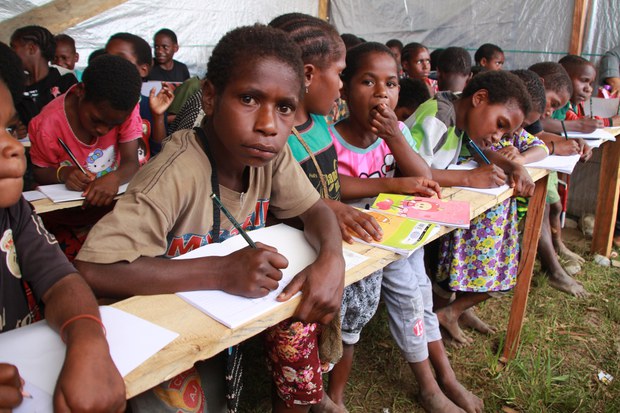Indonesia Vows Action After UN Urges Probes of Alleged Papua Abuses
2019.02.22
Jakarta
Indonesia on Friday said firm action would be taken against officers who abused a detainee after United Nations experts called for an investigation into the incident and other cases of rights violations in the restive Papua region.
A group of U.N. human rights experts said in a statement on Thursday the incident in which a snake was used by police interrogators in Papua to scare a suspected thief into confessing reflected "a widespread pattern of violence" and other abuses by Indonesian security forces in Papua.
"The police are undertaking an investigation into the incident and have stated that disciplinary action will be taken against the individuals in accordance with the rules," Foreign Ministry spokesman Arrmanatha Nasir said.
"This was the action of individuals and is against the national police's rules and regulations," he added, declining to give further details.
The U.N. expert group, which consists of four special rapporteurs and one rapporteur, said tactics including the use of torture were often used against indigenous Papuans and human rights defenders.
"This latest incident is symptomatic of the deeply entrenched discrimination and racism that indigenous Papuans face, including by Indonesian military and police," they said.
“We urge the Government to take urgent measures to prevent the excessive use of force by police and military officials involved in law enforcement in Papua,” the experts said.
“This includes ensuring those who have committed human rights violations against the indigenous population of Papua are held to account,” they added.
The experts said they were also “deeply concerned about what appears to be a culture of impunity and general lack of investigations into allegations of human rights violations in Papua.”
A video circulating online earlier this month showed police in Jayawijaya regency coiled a large snake around a man they accused of stealing a mobile phone.
The man, his hands tied to the back, cowered and screamed in fear as a policeman was heard asking the suspect: "How many times have you stolen a cellphone?"
The local police have apologized for the use of the snake but defended the action, saying it was not meant to harm the detainee and that the animal was tame.
They also said the officers involved had been questioned by the police ethics board.
Other snake incidents?
A lawyer who advocates for human rights in Papua, Veronica Koman, has said police often use snakes while interrogating Papuans, including those arrested for suspected separatist activities.
"When this snake video surfaced, many Papuans, particularly activists who have been in and out of jail for political reasons, said that they have long known that snakes are being used by police and military," she told BenarNews.
She said Sam Lokon, a member of the pro-independence National Committee for West Papua (KNPB), was also interrogated using a snake after he was arrested in January.
“He was put in a cell with a snake. He was beaten, kicked, slapped, and his head was pushed towards the snake to force him to admit that he had stolen a motorbike,” she said.
A low-level separatist conflict has been taking place in Papua, a region where the population is predominantly Melanesian, since the 1960s.
Security forces have been accused of human rights abuses while conducting counter-insurgency operations.
In some of the worst violence to hit Papua, nineteen construction workers and a soldier were killed in early December in attacks claimed by the West Papuan National Liberation Army, the armed wing of the separatist movement.
In response, security forces have carried out operations to hunt the separatist rebels in Nduga regency, where the killings took place.
Rebels said the anti-insurgency campaign had forced hundreds of people to flee to the jungle in fear of the military, with schools and health clinics abandoned.
Papua declared its independence from Dutch colonial rule on Dec. 1, 1961, but that was rejected by the Netherlands and later by Indonesia.
In 1963, Indonesian forces invaded the region and annexed it, and six years later held a controversial referendum in which, according to rights groups, security forces selected slightly more than 1,000 people to agree to the region’s formal absorption into the archipelagic nation.








